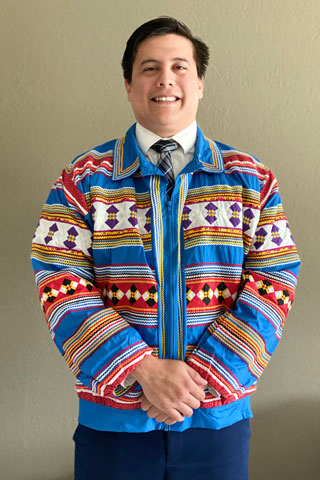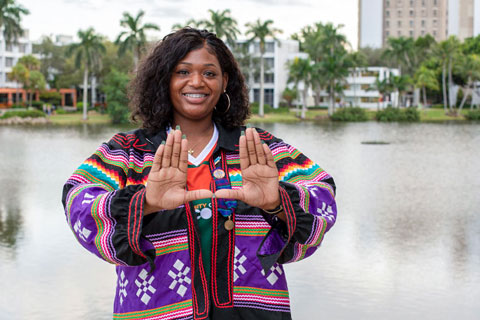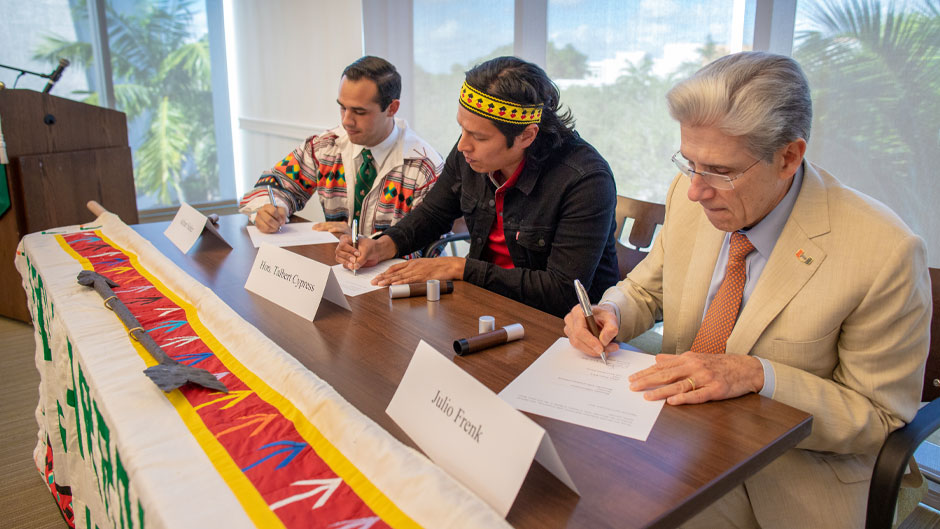As the first Miccosukee Indian to graduate from the University of Miami School of Law, Curtis E. Osceola was often asked by fellow students if the Iron Arrow Honor Society’s ceremonial use of his tribe’s patchwork jackets, drums, and other symbols offended him.
“No,” Osceola was quick to answer. “I’m honored by it. We want you to know about us and having our identity present and ubiquitous at the University is part of that. We’re trying to educate people about who we are, how we are trying to survive, and having Iron Arrow members—who represent UM’s best and brightest—as our ambassadors helps us do that.”
Osceola still feels that way. But, amid the nation’s reckoning with systemic racism and persistent criticism, particularly from other Native American students, he agreed to help the society change three traditions rooted in the culture of the Seminole Indian Tribe of South Florida, from which the Miccosukee separated in 1962.

Effective immediately, Iron Arrow members will no longer continuously bang a ceremonial drum on initiation days, when they march across the University in a solemn procession to tap new members. Now the drum will sound only for a few seconds, right before new members—who are chosen for their love of alma mater, character, leadership, scholarship, and humility—are tapped with an iron arrow. The drum will sound again for another few beats before new inductees are presented to the society.
The organization is also modernizing its student leadership titles, dropping the Seminole’s historic appellations, and replacing them with the Miccosukee’s contemporary titles. Members of the society’s executive board will now be known as chair, assistant chair, and lawmaker, rather than the chief, son-of-chief, and medicine man titles the Seminoles used when Bowman Foster Ashe, the University’s first president, co-founded Iron Arrow in 1926 to honor male students who contributed to the University’s “glory, fame, and growth.” Grounded in the principles of cultural exchange, the society would remain an all-male organization until 1985.
In the third change, Iron Arrow members will no longer fold their arms during solemn ceremonies. Instead, they will cross their arms in front of them, clasping their hands, right over left.
The changes, which were announced in a joint statement recently signed by Osceola, who became the Miccosukee’s official liaison to the honor society in 2018, and Iron Arrow Chair Cachay Byrd, who was elected last May, underscore the growing recognition that perceptions matter. As the Black Lives Matter movement against racial injustice spawned a national reexamination of the offensive use of Native American symbols and culture, the society felt compelled to act.

But even more important, Byrd said, was the growing perception among some of the University’s Native American students that the pain they felt hearing the relentless beat of the drum or seeing people of different ethnicities participate in sacred ceremonies didn’t matter. For years, students, faculty members, and others who questioned the practices were given the same accurate explanation: Everything Iron Arrow does is with the approval and under the guidance of the Miccosukee tribe.
“We were founded on cultural exchange, so we couldn’t continue to ignore our students on campus who are raising these concerns,” said Byrd, a nursing student who said she ran for Iron Arrow’s top post last May in hopes of being part of this change.
“As an organization that claims to be the highest honor attained at the University of Miami, how can we say, ‘My character, my leadership, my scholarship, my humility are intact,’ when Native American students are expressing how some of our traditions and practices make them uncomfortable?”
Though the statement, which revised the practices Native American students most objected to, was issued when the Fall 2020 semester opened, the foundation for it was laid more than two years earlier. In November 2018, Iron Arrow and the Miccosukee reaffirmed their relationship in a Memorandum of Understanding that acknowledged “the existing climate of paternalism and cultural appropriation.”
Signed by University President Julio Frenk, Iron Arrow Chief Adrian Nuñez, and tribal Secretary Talbert Cypress, the memorandum declared the Miccosukee’s continued support for how Iron Arrow “acknowledges, praises, and practices the traditions and culture of the Miccosukee.” But what the memorandum did not state is that the society was already working with the tribe to reassess the authenticity and relevance of its internal practices.
That process began when Osceola, then in his final year of law school, was invited to give a presentation on cultural appropriation at a Students of Color symposium sponsored by the Office of Multicultural Student Affairs. During the two-hour discussion, Osceola said he placed Iron Arrow on one end of a spectrum of entities that honor native culture and the Washington Redskins on the other end. The NFL team recently dropped what was widely regarded as one of the most offensive nicknames in the sports world to become known simply as the Washington Football Team.
After his presentation, Osceola recalled, Nuñez, who would soon become Iron Arrow’s chief, asked Osceola to help the honor society “figure out what’s appropriate and what we can do better.” Appointed by the tribe to act as its official liaison, Osceola and society leaders began reviewing the society’s internal, secret practices, and dispensing with extraneous ones. They also resolved to strengthen the society’s cultural bonds to the tribe, a commitment they began meeting by bringing Miccosukee high schoolers to campus for daylong visits.
The first person in the 600-member tribe to become a lawyer, Osceola said such exchanges are critical for the future of the Miccosukee, who after centuries of fighting colonialism, war, disease, cultural assimilation, and removal efforts by the United States, are now struggling to help the next generation find its place in the outside world.
“It’s getting better, but a lot of our kids don’t go to college. They don’t finish high school, and they’re not well-equipped for the future,” said Osceola, who also earned his bachelor’s degree in business administration from the University and is now an assistant public defender. “So, we all agreed we both need to do better to expose kids to the University environment, to show them the University is not a big scary place. There is a lot of diversity here and you can find your place.”
And, as Winston Warrior, Iron Arrow’s faculty advisor, noted, that diversity has never been more evident in Iron Arrow, which 35 years after it was forced to admit women, is now led by three female students—two Black and one Asian—and guided by a Black man.
“As a university, we had to go through our learning and growing pains and Iron Arrow wasn’t exempt from that,” said Warrior, a double alumnus who was tapped in 1992 and now leads strategic communications, marketing, and operations for the School of Education and Human Development. “It’s like the United States—which is still trying to create a more perfect union—Iron Arrow continues to strive to be what we espouse to be.”
For Traci Ardren, professor of anthropology and an expert in the Maya and other New World prehistoric cultures, the changes do not go far enough. “The bottom line is that the top honor society of UM does not need to have any trappings of dress up or play Indian,” she said. “It’s not appropriate for who we say we are as a university. And it will always be offensive to Native students and faculty members.”
In the joint statement, the Miccosukee recognize that many other Native Americans do not share their perspective on cultural exchange. They also acknowledge that their “brothers and sisters” are hurting from “the theft of their land, the destruction of their cultures and languages, appropriation of their arts and imagery, and the marginalization of their identity.” But asserting the tribe’s hard-won sovereignty, the tribe asks others to respect its right to engage in cultural exchange with Iron Arrow, a relationship that tribal members believe honors their ancestry, culture, and art, and is crucial to fostering a better world.
“One of the most powerful aspects of diversity and inclusion is the notion of cultural exchange where we evolve from mere tolerance of differences to actually celebrating and sharing those differences,” the statement concluded.

